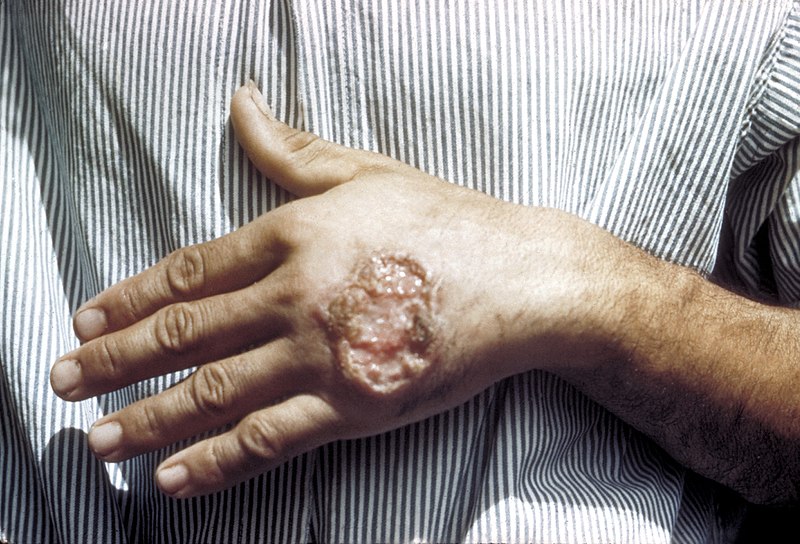Playlist
Show Playlist
Hide Playlist
Visceral Leishmaniasis (Kala-azar) – Protozoa (Visceral Infection)
-
Slides 12 Leishmania MicrobiologyAdvanced.pdf
-
Download Lecture Overview
00:01 So how do we diagnose Kala-azar or other leishmaniasis infections? One way, that's very well documented is by polymerase chain reaction. 00:11 We look for the DNA of the organism in samples from either a lesion or from blood, depending on the kind of disease. 00:19 And you can learn more about PCR in our earlier lectures on this topic. 00:24 We can also examine histology material from biopsies. 00:29 You can take biopsies of lesions for example and look in the microscope and see the typical forms of the parasite. 00:36 There is also an antibody test, which is in ELISA-based test which can be done in the field. 00:42 This is a very easy to carry out test, which involves a microscope slide that has been coated with a matrix. 00:50 And that matrix at one end contains antibodies that are looking for either proteins or proteins that can be used to detect antibodies. 01:01 In this case we're asking, does the person have antibodies against leishmania? So what you do in practice is you take a little bit of blood, a drop of blood will do, and you drop it at one end of the slide. 01:14 The blood then begins to move across the matrix on the slide and after a certain amount of incubation, 10 or 15 minutes, you can then read out the result as either negative or positive, or invalid. 01:31 So embedded in this slide is a compound that will react with every blood sample, it is something known to be in all blood, infected or uninfected, so that gives you the line that tells you the assay worked. 01:44 And then the second slide there that's label positive, there's an additional line which would tell us in this case, that the sample contains antibodies to leishmania, because on that line on the side, we've embedded antigens against the parasite. 01:58 So a very rapid inexpensive field applicable test for diagnosis. 02:04 We can treat leishmania infections with a variety compounds, one of them is Sodium stibogluconate, shown here. 02:13 And another is Amphotericin B. 02:16 Unfortunately, there is growing resistance to the use of some of these compounds necessitating other approaches to treatment and one of those is Cycloguanil pamoate. 02:28 A number of vaccines are under development because leishmania particularly the visceral form is extensive and lethal, many vaccines are being developed and eventually one of them or more will come to market. 02:41 Under exploration, our whole parasite vaccines where we grow the parasites they are in activated, so they're no longer infectious, they can be injected. 02:50 Individual proteins purified from the parasite or recombinant proteins made by recombinant DNA technology. 02:59 Synthetic peptides, short amino acid sequences, 20 to 40 amino acids that are synthesize, which can be injected to give rise to immunological protection. 03:09 And finally, DNA vaccines in which plasmids containing coding regions for various leishmania protein can be injected into the host. 03:18 Interestingly, another type of vaccine that's recently shown some promise in animal trials is a vaccine against sand fly salivary proteins. 03:30 Apparently, these are required for leishmania to be able to establish itself in the host. 03:36 So if you can make antibodies against the fly proteins, this could be protective. 03:41 So an interesting approach to dealing with this disease. 03:45 How do we prevent leishmania infection? Well, we can use insecticides to try and get rid of the sand fly. 03:51 You could spray your entire home, you could just use bed nets, and spray those as well. 03:58 And of course, screens and curtains would help as well as that.
About the Lecture
The lecture Visceral Leishmaniasis (Kala-azar) – Protozoa (Visceral Infection) by Vincent Racaniello, PhD is from the course Parasites.
Included Quiz Questions
Which of the following tests is NOT useful for detecting leishmaniasis?
- UV microscopy
- PCR
- ELISA
- Microscopy
- Antigen antibody test
Which of the following is the fastest test for detecting leishmaniasis?
- Immunochromatography test (ICT)
- PCR
- Microscopy
- Antigen antibody test
- ELISA
Which of the following is the most effective drug for the treatment of leishmaniasis?
- Amphotericin B
- Itraconazole
- Methotrexate
- Aspirin
- Propranolol
Which of the following can be used to vaccinate against Leishmania?
- Sand fly salivary proteins
- Cycloguanil pamoate
- Sodium stibogluconate
- Amphotericin B
- Methotrexate
Customer reviews
5,0 of 5 stars
| 5 Stars |
|
5 |
| 4 Stars |
|
0 |
| 3 Stars |
|
0 |
| 2 Stars |
|
0 |
| 1 Star |
|
0 |




